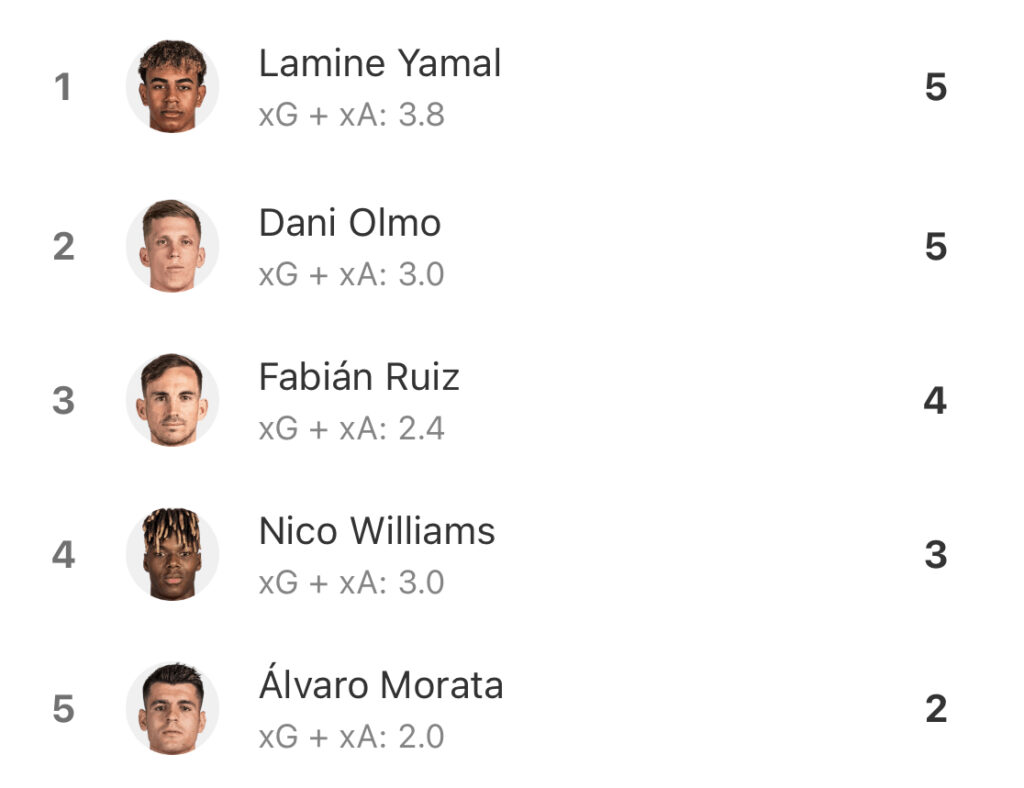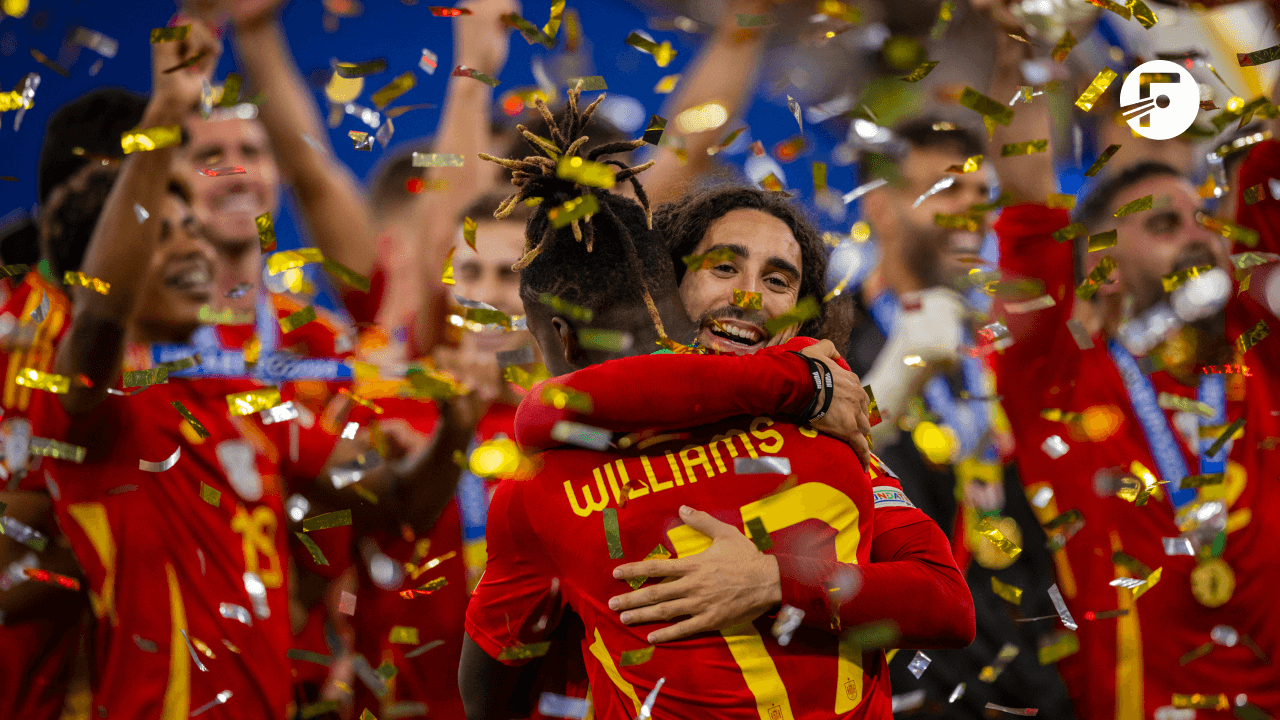Spain have enjoyed an incredible summer on the footballing front, winning almost every possible title across all levels and age groups. Given the manner and sheer number of their victories, this could well go down as the year that marked the beginning of another dominant spell for La Roja.
By Neel Shelat
Between EURO 2024, the Women’s Under-19 Euros, the Men’s Under-19 Euros, the Women’s Under-17 Euros and now both the Men’s and Women’s Olympic Football Tournaments, Spain are on course to win it all this summer. Go back just one more year, and their collection of fresh silverware extends to the Women’s World Cup, and both the Men’s and Women’s Nations Leagues in what has been an incredible period of unprecedented success across all levels for La Roja.
Besides the fact that they have done it, how they have done it suggests that Spain will not stop winning titles anytime soon. In fact, we could well be witnessing the start of the most dominant dynasty international football has ever seen. So, it is well worth taking a look at how Spain have managed to reach such a position.
A Wealth of Talent
Quite simply, the way to win lots of international titles for a nation is to produce lots of talented players. Having a big population is a good start and Spain are not doing too badly in that respect as they are approaching 50 million, but the key lies in having great academies to develop young talent. That is what sets Spain apart from their competitors.
La Masia, of course, is among the world’s very best and most prestigious youth academies. Year after year, some of the world’s most promising male and female footballers graduate into the senior Barcelona sides. Of course, most of them are Spanish, so they also play for the country’s youth teams as they climb up the ranks before potentially going on to get senior call-ups. La Masia’s status also enables Barcelona to sign the best Spanish youth talents from elsewhere and mould them into the very best in the world, as has recently happened in the cases of Pedri and Vicky López.
Not to be outdone, Barcelona’s old rivals Real Madrid have a pretty good academy too. La Fábrica might not have produced the most elite of elite talent in recent years, but it has a pretty good and consistent track record too. The next generation looks quite promising as well, as Real Madrid sent five players each to the title-winning squads of the Men’s and Women’s Under-19 Euros this summer.
Even beyond the big two, great academies can be found all over the country. Athletic Club’s Basque-only player policy has compelled them to develop a top-class cantera, which produced one of the breakout talents of EURO 2024 in Nico Williams as well as Women’s Under-19 Euros player of the tournament Daniela Agote. Their neighbours Real Sociedad have a fantastic track record of developing young talents themselves too, with their own Mikel Oyarzabal proving to be the match-winner in the Euro final.
We have not even mentioned the likes of Valencia, Villarreal, and Atlético Madrid, but the point should be clear enough already: there is no shortage of places for young players to develop in Spain.
Trust in Youth
Producing promising youngsters is one thing, but it counts for little at the highest level unless their transition to senior football is properly managed. Spain have done very well in that respect, of late, with their Euro triumph this summer epitomising their trust in youth.
Right from the off, Luis de la Fuente started with two teenagers on the wings as then-16-year-old Lamine Yamal joined Nico Williams on either side of the striker. La Roja struggled with attacking impetus at the last World Cup, but their new wing pairing instantly solved that problem with their dynamic attacking and ended the tournament with eight goal involvements between them.

A similar story set Spain on the path to World Cup success last summer. Teenage forward Salma Paralluelo was entrusted to go off the bench with the scores level in both the quarter-final and semi-final, and she scored game-changing goals in both matches to take her side to the final.
Indeed, Spain have never shied away from placing big responsibilities on the shoulders of their best young starlets in recent years, with the likes of Pedri and Gavi as further examples of that. The men’s team, though – particularly in the case of the former Las Palmas midfielder – have been guilty of overworking them at too young an age (with assistance from partners-in-crime Barcelona). Pedri was a key starter for them at the Euros in 2021 and then got sent to Japan for the Olympics, almost immediately after which the new club season got underway. Sure enough, he has suffered from recurring hamstring injuries thereafter and is yet to complete a full season of fitness since.
Spain would do well to avoid repeating that mistake with their freshest starlets, and the fact that none of their young Euro starters are at the Olympics is a positive sign. As long as their youngsters’ game time is managed sensibly, La Roja will surely continue to have one of the best teams in the world for years to come.
A Consistent Tactical Identity
A big reason why Spain have been able to integrate their best young talents into their senior teams so seamlessly is their consistent tactical identity across all levels. Regardless of whether it is the under-17s, under-19s, under-21s or senior side, La Roja employ a very distinct brand of possession-based football in a 4-3-3 formation.
Player roles remain very similar in that framework – ball-playing centre-backs, deep ball-playing full-backs, a tempo-setting number six, two attack-minded number eights who must be comfortable with the ball in tight spaces, wide wingers who like to dribble and a line-leading striker who can link up with their teammates – so it is very easy to lift and shift almost anyone across teams. By the time a player gets to senior football, they know their roles and responsibilities inside out and therefore require very little time to settle in.
It should be said, though, that the role of the head coach remains important even if the template is effectively preset. The difference between Luis Enrqiue’s Spain and Luis de la Fuente’s Spain should underscore that, so the only thing La Roja need to ensure is that they get their coaching appointments right.
Spain are blessed with an abundance of talent, world-class talent production factories and a good framework for such players to progress into senior football, so they look set to dominate the international stage for years to come.
(Cover image from IMAGO)
You can follow every game at the Olympics live with FotMob — featuring deep stats coverage and player ratings. Download the free app here.
